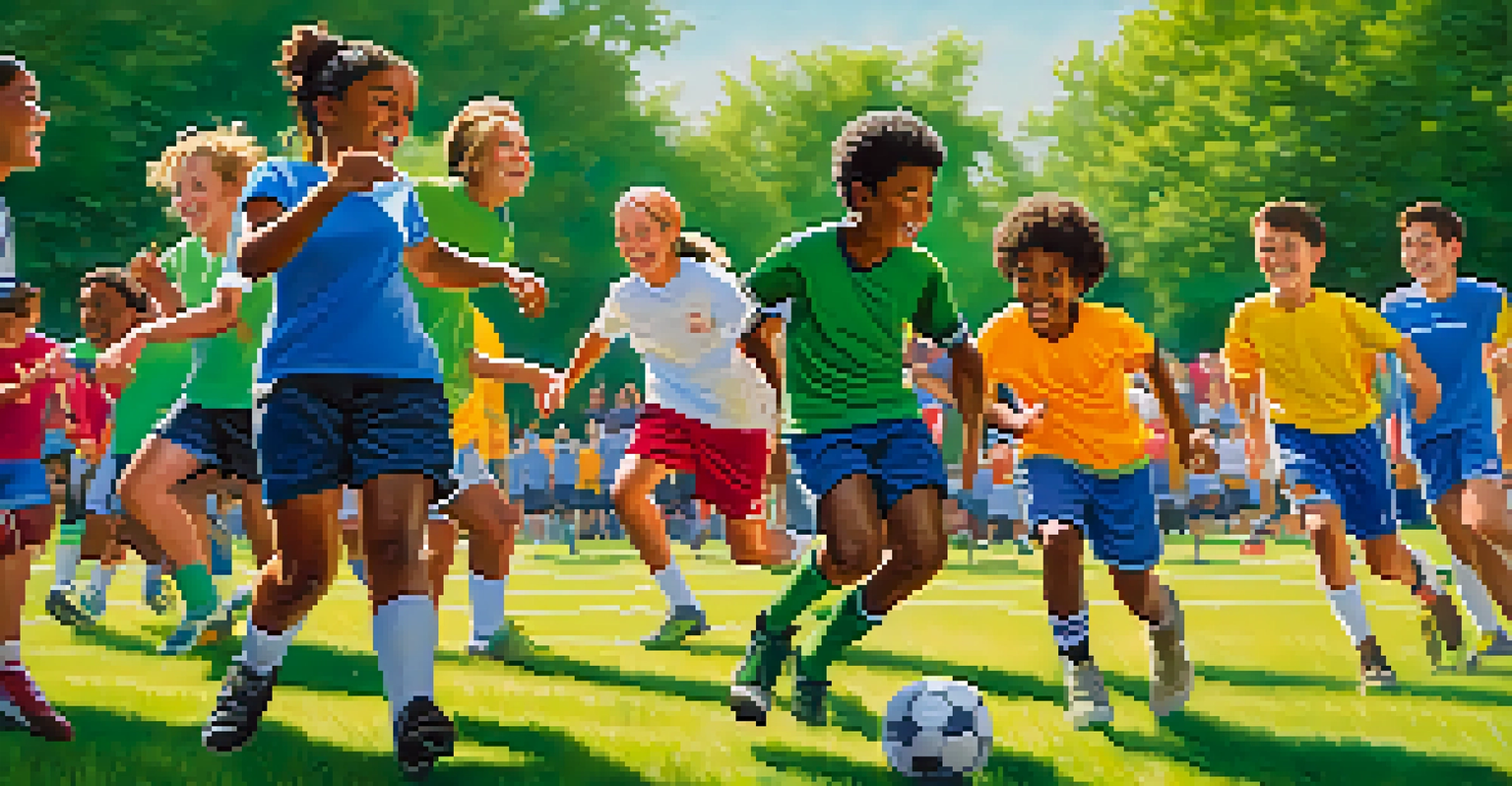Extracurricular Activities Impacting Missouri Students' Growth

Understanding Extracurricular Activities in Missouri Schools
Extracurricular activities encompass a wide range of school-sponsored programs that occur outside the standard curriculum. These can include sports, clubs, music bands, and community service initiatives. In Missouri, schools often promote these activities to enrich students' educational experiences and foster personal development.
Extracurricular activities are a great way for students to explore their interests and develop skills that will serve them well in the future.
The importance of these activities cannot be overstated; they offer students opportunities to explore interests and develop skills that might not be addressed in the classroom. For example, a student who joins the debate team can enhance their public speaking and critical thinking skills, which are invaluable in any career path.
Moreover, these programs help students build lasting friendships and a sense of community. In Missouri, where schools often serve as community hubs, extracurricular activities can strengthen bonds among students, teachers, and local residents, cultivating a supportive environment for growth.
Personal Development Through Extracurricular Engagement
Engaging in extracurricular activities plays a critical role in personal development for Missouri students. These experiences teach valuable life skills such as teamwork, leadership, and time management. Learning to balance academics with extracurricular commitments can prepare students for the demands of adult life.

For instance, a student involved in a sports team must learn to collaborate with teammates while also managing their academic responsibilities. This balancing act cultivates resilience and discipline, traits that are essential in both personal and professional realms.
Benefits of Extracurricular Activities
Extracurricular activities enrich students' educational experiences and foster personal development through skills like teamwork and leadership.
Additionally, students often find that their interests and passions flourish when they participate in these activities. Whether it’s discovering a love for science through a robotics club or honing artistic skills in theater, these experiences can ignite lifelong passions and career aspirations.
Academic Improvement Linked to Extracurricular Participation
Research consistently shows that students who engage in extracurricular activities tend to perform better academically. In Missouri, many schools have noted that students involved in these activities often maintain higher GPAs compared to their peers who do not participate. This correlation can be attributed to the skills learned through extracurriculars, such as improved time management and enhanced focus.
Extracurricular activities are a critical part of a well-rounded education, providing students with opportunities to develop skills that will benefit them throughout their lives.
Moreover, extracurricular activities provide students with a sense of purpose and motivation to excel in their studies. For instance, a student may strive to maintain good grades to remain eligible for the varsity basketball team, highlighting how participation can directly impact academic performance.
It's also worth noting that these activities can create a positive feedback loop: as students see academic improvement, their confidence grows, which may encourage them to engage even more in both schoolwork and extracurriculars, further boosting their overall academic success.
Social Skills Development Through Extracurriculars
Extracurricular activities serve as a fantastic platform for students to develop crucial social skills. In Missouri schools, students interact with peers from diverse backgrounds, teaching them how to communicate effectively and work collaboratively. These interactions help nurture empathy and understanding, essential qualities in our increasingly interconnected world.
For example, participating in a student-led community service project allows students to not only meet new friends but also to learn about different perspectives and the importance of giving back. These experiences can foster a sense of belonging and community pride.
Community Support is Crucial
Community involvement enhances extracurricular programs by providing resources and encouragement, helping students feel valued and supported.
Additionally, the relationships formed in these settings can often translate into lifelong friendships and professional networks. The social skills gained through extracurricular activities can also enhance students’ confidence in social situations, paving the way for future success in college and beyond.
The Role of Community in Supporting Extracurriculars
Community support plays a vital role in the success of extracurricular activities in Missouri schools. Local businesses, organizations, and families often contribute resources, funding, and time to help enhance these programs. This support ensures that a variety of activities are available to students, regardless of their backgrounds.
For instance, many Missouri schools partner with local sports clubs to offer training and resources for student-athletes. This collaboration not only enriches the students’ experiences but also strengthens the ties between schools and the communities they serve.
Moreover, community involvement in schools fosters an environment where students feel valued and supported. When students see their community invested in their activities, it can inspire them to work harder and engage more fully, knowing they have a network cheering them on.
Extracurriculars and College Readiness
As students in Missouri prepare for higher education, extracurricular activities can significantly enhance their college readiness. Many colleges and universities look for well-rounded applicants who have not only excelled academically but have also engaged in extracurricular pursuits. This holistic approach can make a student stand out in the competitive college admissions process.
Involvement in clubs, sports, or volunteer work can provide students with valuable experiences to highlight in college applications. For example, a student who has served as president of a club can showcase leadership skills and initiative, traits that colleges find appealing.
Extracurriculars Boost Academic Success
Participation in extracurricular activities is linked to improved academic performance, as students develop essential skills like time management and motivation.
Additionally, extracurricular activities often help students develop a clearer sense of their interests and career goals, which is crucial for selecting a college major. As they explore various fields and roles, students can make more informed decisions about their future, ultimately setting them up for success.
Challenges Faced by Students in Extracurricular Activities
While extracurricular activities offer numerous benefits, students in Missouri may also face challenges when participating. Balancing schoolwork, extracurriculars, and personal life can be difficult, leading to stress and burnout. It's essential for students to find a healthy equilibrium to enjoy these activities without compromising their academic performance.
Moreover, not all students have equal access to extracurricular opportunities, which can create disparities. For instance, students from lower-income backgrounds might struggle to afford fees associated with certain clubs or sports. This lack of access can hinder their ability to engage in activities that foster personal growth and development.

To address these challenges, schools and communities must work together to create inclusive environments. Offering scholarships, waivers, or alternative programs can help ensure that all students, regardless of background, can benefit from the positive impacts of extracurricular activities.